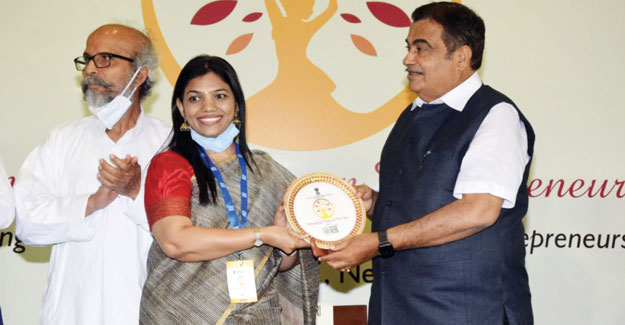
My Only Option Was To Emerge Successful
407 weavers, 230 of which are women. A novel branding concept, where each product has a human story behind it. An attempt to make a remote, almost unknown village of Madhya Pradesh into a hub of textile tourism.
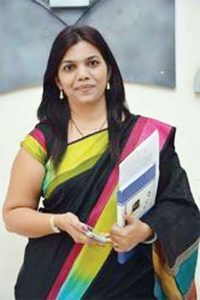
(Seema Mishra)
These are just some of the novelties of the Kasrawad Art Cluster (KAC), situated on the banks of Narmada river, in Madhya Pradesh. The cluster is the brain child of Seema Mishra, a young woman who worked tirelessly and intelligently to ensure livelihoods to hundreds of weavers in the cluster. During this journey of some ten years, she has worn many hats - an educationist, a reporter, an e-commerce entrepreneur.
The first looms get installed in Kasrawad
"This has been a great journey of learning for me. I decided to move to this remote area some ten years ago, after having lived a fast-paced life in Mumbai and Dubai. I started working in Mandleshwar as an educationist. At that time, I also dabbled in trading of Maheshwari saris and stoles. I was fascinated with this heritage weave of India. I wanted to do something more. After a lot of research into the product, market, and the skills needed, I realised that a weaving cluster in Kasrawad, situated on the banks of Narmada river, would be a great choice to take the Maheshwari weave forward. Maheshwar is already well-known, it's a world heritage site. Weavers in Kasrawad and four adjoining villages depended on Maheshwar for their livelihood, and this was seasonal." It was the women of Kasrawad too, who inspired Seema to start this venture. "There was one unrelenting lady who pleaded with me to help her husband, a master weaver. I found he had good weaving skills. I already owned a few looms in Maheshwar then. I invested in some looms for this family too, marking the beginning of my venture in this untouched village full of talented weavers."
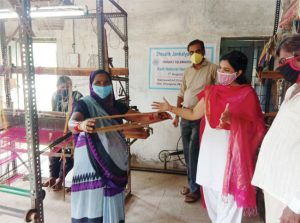
Seema Mishra (in red and white) working with the weavers at KAC
Branding, winning accolades
Seema was quick to realise that while setting up this venture was her goal, she needed to brand herself too. In this small town, she was recognised as a prolific speaker and presenter. "I took every opportunity that came my way, to present myself and the cluster. This helped me get a lot of recognition and awards." Seema has won many prestigious central and state government awards for her work. Textile and related associations have also recognised and commended her work.
Overcoming hurdles
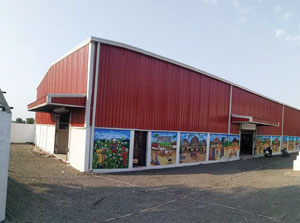
(KAC facility adorned with murals)
It is then that she learnt about a central government scheme for cluster development. "This was my big chance to do something more worthwhile. And it also turned out to be a really big challenge." Meeting the stipulations for the scheme, getting the necessary permissions was a daunting task in itself. "Overcoming the hurdles that a woman entrepreneur would face was not easy. I had already invested all my savings in this project, I had borrowed money on interest too. I was a first generation entrepreneur with no business background at all. And now I could not go back. I had to emerge a winner, that was the only option I had," recalls Seema.
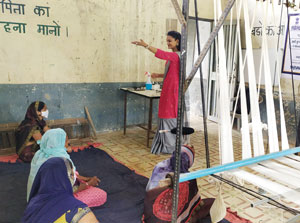
(Seema with the women weavers of KAC)
Seema had to think and act fast, out-of-the-box, and intelligently. She realised she would need a media platform to propagate the message about the cluster scheme. "I became a reporter myself, and made several reports on the benefits of the scheme for the village and especially highlighted the importance of Handloom Day covering the adjoining five villages."
Weavers' support
Weavers of the village luckily rallied around in support of Seema Mishra. Seema's goodwill, intelligence and luck helped her to finally move ahead with the project. "The scheme stipulated the setting up of an SPV - Special Purpose Vehicle, which included 10 weavers as members, besides me and my partners, and the government, of course. So, the weavers were present in all the meetings with government officials, which really helped to gain their confidence. Weavers will reap 33% of the profit of the SPV. Government monitoring will be part of the scheme for the first three years and then the cluster will be handed over to the SPV."
KAC as a model cluster
The cluster became fully operational in April 2021. "We decided that each creation will be named after the weaver who has created the product. So we have a sari named Usha, a stole named Rekha and a new cotton blend stole named Santoshi. Each of our creations has a human story behind it. Weavers too feel a sense of ownership, and ensure the best quality. For me, there can be no compromise on quality and hence every product comes with a trust seal i.e. the Handloom Mark ," said Seema.
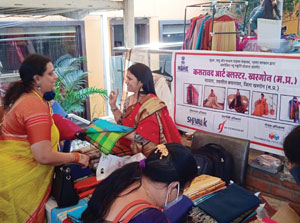
(Seema handling the sales and marketing of her cluster)
Seema Mishra has met all the environmental, social and economic norms that have been stipulated by law. "I want to ensure that KAC becomes a model of a sustainable handloom cluster." The cluster now makes, besides saris and stoles, menswear, womens wear, wraparounds for new born babies, and home textiles. "We have set up some cut-and-sew machines too in the common facility centre. Readymade apparel and home textiles have been quite popular. And this fulfils my aim of creating awareness about the Maheshwari weave among Indian consumers." Now, Seema is ready to explore the international markets too. "I will also start my entrepreneurship development and training programmes soon. We have a small, well-equipped studio and a pilot loom set up, where I would like to invite students from across India, to learn and get trained in handloom weaving and marketing."
KAC could become the centre of textile tourism
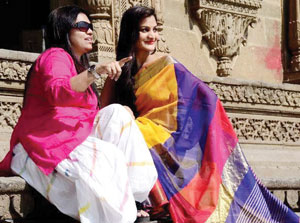
(Showcasing the creations of KAC)
Going forward, Seema wants to convert this almost unknown village into a tourism hub. "We have a 150 year old Shiva temple here that hardly anyone knows about. It's pristine. I made a presentation to the DM here, for carrying out renovations and restoration of the area, so we can attract tourists, create employment. And I will ensure that the tourists also visit the Kasrawad cluster, thus increasing business for the weavers. My proposals have been accepted. I am happy to inform that the letter for the same has been forwarded by the DM to the SDM to start the work immediately. Also there is a famous tourist attraction called Sahastra Dhaara which means a thousand streams which arise out of the holy river Narmada as it flows over a rocky patch and thus makes it a tourist attraction. These two tourist attractions would help Kasrawad Art Cluster to develop into a tourism hub."
`Women can make India Atmanirbhar'
Her parting message to the readers - "As Gandhi said, real India lives in the villages. If just one girl like me from every metro city of the country can step out into the village, adopt a village and create such clusters to protect the rich heritage of India, we will be a prosperous country and fulfil the goal of Atmanirbhar Bharat and Vocal for Local, which is a dream of our honourable Prime Minister."
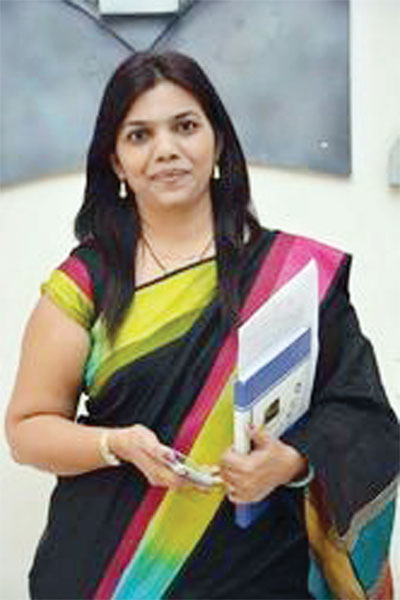
Kasrawad Art Cluster (KAC), situated on the banks of Narmada river, in Madhya Pradesh. The cluster is the brain child of Seema Mishra, a young woman who worked tirelessly and intelligently to ensure livelihoods to hundreds of weavers in the cluster. During this journey of some ten years, she has worn many hats - an educationist, a reporter, an e-commerce entrepreneur.
If you wish to Subscribe to Textile Excellence Print Edition, kindly fill in the below form and we shall get back to you with details.













